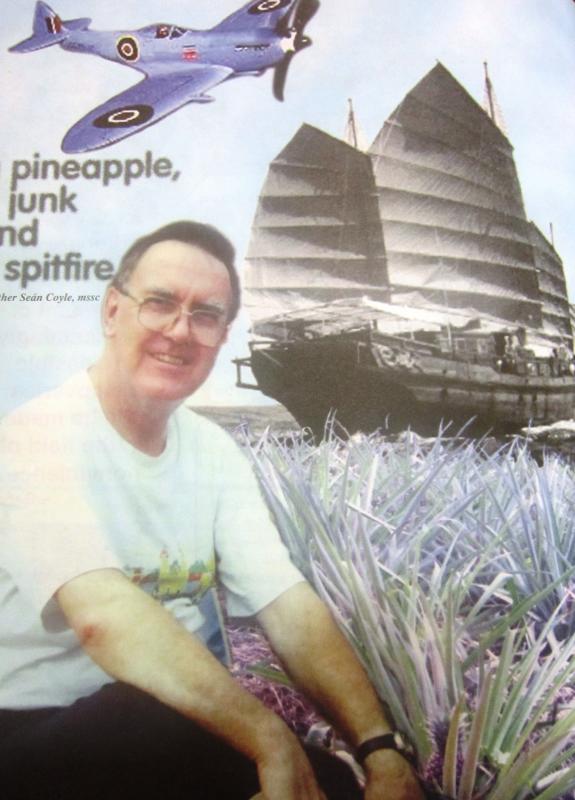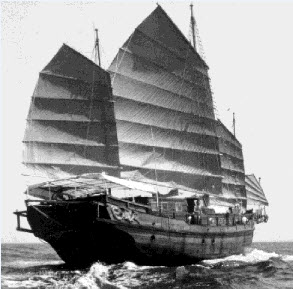A Pineapple, A Junk And A Spitfire
By Father Seán Coyle mssc
The first book I ever read, when I was, 7 was Treasure Island. A map guided Jim Hawkins and his friends to the hidden treasure of my vocation during my teenage years.

My first clue
The first clue was Sister Gemma in my second year in kindergarten. She spoke about the need to support missionaries and asked us to speak to our parents. My classmates brought in the equivalent of a peso but mine gave me the equivalent of five, a lot of money for them as my father worked as a carpenter on a construction site. Sister Gemma gave me a little calendar with a picture of St. Thérèse of Lisieux, Patroness of Missionaries. I didn’t know at that time that the saint would influence me greatly years after my ordination, even though I still don’t like the name she gave herself, “the Little Flower”.
Father Woods
The following year Father Woods came our school. He was a parishioner but worked somewhere in Africa, which was unimaginable far away for us, a place where the people hadn’t heard the Good News. At least that is what the Sisters told us. I don’t remember a thing Father Woods said but I can still see him sitting in front of us, a fascinated audience, showing us articrafts from the country where he worked.
Pineapple don’t grow on trees
When I was a child pineapples were very expensive in Ireland and I dreamed of living in a country were they grew. Only after two years in the Philippines did I discover that they didn’t grow on trees! But my childhood dream was all part of the Lord’s gracious invitation.
My first contact with the Columbans in kindergarten was tier magazine, The Far East. It had a picture of a traditional Chinese boat, a junk, on the cover. That was to take to my “Treasure Island”.

Influential Johns
I was confirmed in Grade Four. My teacher, John Gallingan, was a very proud of his family and always talking about his wife. He once brought her to meet us, the only teacher who ever did that. He also had a great love for the Mass and taught us how to use t he bilingual Latin-English missal in those pre-Vatican II days when everything in Church was in Latin. John Gallingan, as I realized only years later, had a deep influence on me, as did another John, my father, who went to Mass everyday of his life up to the day he died. My Dad didn’t talked about his faith. He just lived it and was the same person with everyone he me, deeply respectful to all.
An eye for the girls and spitfire
In high school I tried to go to Mass every day, often enough, especially on cold, winter mornings, I just turned over and got some extra sleep instead. By this time too I and already begun to see that girls my own age were very attractive. And I wanted to be a pilot, as did all my barkada. We were all strongly under the influence of Biggles, a fictional fighter pilot in the Royal Air force. We devoured the novels Captain W.E. Johns wrote about him. He flew a Spitfire, a fighter plane that with the Hurricane won the Battle of Britain in 1940. To this day, though I am a pacifist, more or less, I find few things more beautiful than the graceful spitfire in flight, the closest thing to a bird that man has ever made.
Of that barkada of would-be pilots, two became doctors, one a diplomat and I a priest. During that first year in high school I began to feel the stirrings of an interest in being a priest. And it was always an interest in being a missionary priest. Other countries have always fascinated me and God built on that natural interest which he had put there in the first place.
Missionary shopping
The following summer, 1957, I got my first job, at a small gasoline station. There weren’t too many costumers and I had lots of time to read. I used to bring copies of The Far East and other material about missionaries to work and it became very clear to me that I really wanted to be a missionary priest. I still had four years to do in high school but my desire never wavered, despite the fact that I continued to notice that girls my own age were not only nice to look at but even nicer to be with. The idea of not being with them was the most difficult part of joining the Columbans in 1961. I had decided on the Columbans two years before that. I had shopped around all the missionary groups. Reading the students’ column in The Far East I wanted to be with these young men who were so human, not too much unlike myself. A Christian Brother who taught us, who didn’t know what I was thinking, said to us in class one day, “Only the best join the Columbans.” That encouraged me.
Another factor that drew me to the Columbans was that they had been founded in my native Ireland but were international in membership, with men from Ireland, Britain, Australia, New Zealand and the USA working together in each country where there were Columbans. That international aspect has expanded and now we have members from Chile, China, Fiji, Korea, Peru, Philippines, Tonga and Vietnam.
The Columbans are secular priests not religious. I never felt any desire to take a vow of poverty, though I had no expectation that I would become a millionaire either. Nor have I!
To be a missionary – nothing else
Behind all of this was a desire to bring the Good News to people who hadn’t heard it or whose church still needed support from overseas. I had a simple view of thins but it was real and I’m convinced that the Lord was speaking to me through it.
The seminary years only strengthened my desire to be a missionary priest. Time and time again my experience as a priest has confirmed that, especially on occasions such as students’ retreats when young people, who so often judge themselves harshly, get an inkling of God’s unconditional and tender love for them. In recent years I find myself repeating more and more to people one of my favorite lines in the Bible, and it occurs many times, “God takes delight in his people.”
Maybe God has called me to be a Columban just to learn for myself and to tell others about it.
